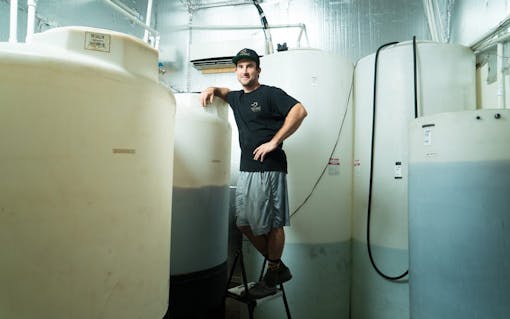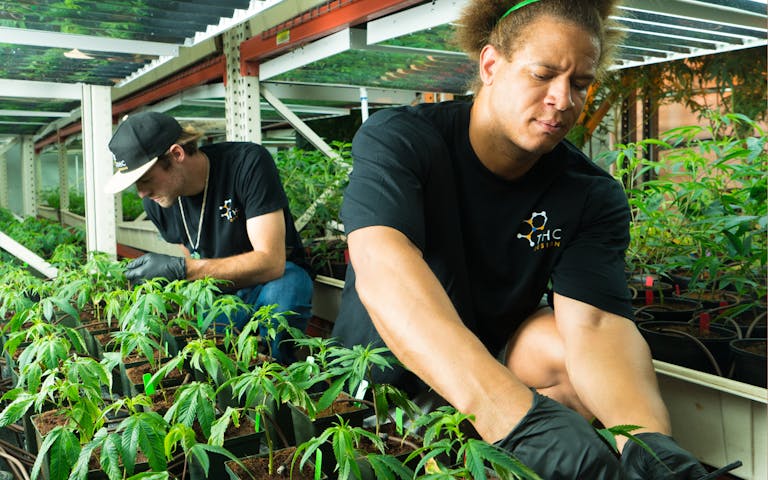Inside a nondescript industrial warehouse outside Downtown Los Angeles, nestled among a sea of other nondescript warehouses, Army veteran Steven Passmore is hard at work. His hair is pulled back with a thin, stretchy headband, and beads of sweat drip down his temples as he shuttles between temperature-controlled rooms. Heat, humidity, and the skunky smell of sensimilla ebb and flow as he traverses the maze of cultivation rooms that make up the grow facility for THC Design.
Passmore, 33, started working in the warehouse about a month ago as part of the company’s recently launched internship for veterans. The 12-week, paid program teaches the cannabis cultivation process from seed to sale, emphasizing on on-the-job learning.
“For some veterans, they need a dog. For some of them, they need a support group. For me, I like plants,” Passmore says. “I like the idea and the opportunity to help something live, to help something grow.”
The internship program, Passmore says, “definitely was a perfect fit for me.” He’d tried to break into the cannabis biz before, even going door-to-door handing out resumes at dispensaries, but to no avail. It seemed being a veteran wasn’t widely acceptable in the industry at the time, he says. But while other companies may have boxed out Passmore out, THC Design offered him a foot in the door. With help from community partners such as the Santa Cruz Veterans Alliance, the company actively solicited veterans and received about 65 applications.
Though the program was designed to accommodate a total of only four interns, Ryan Jennemann, THC Design’s co-founder and lead consultant, said he was so impressed by the applicant pool that he ended up hiring three veterans as full-time employees and two more as interns.
“I was doing it because I wanted quality employees in the company,” Jenneman says, noting that veterans, in his experience, tend to be smart, respectful, and hard-working. “It wasn’t some PR stunt or marketing venture.”

Zac Williams and Steven Passmore, whom THC Designs found through a veteran-outreach initiative, stands next to company cofounders Jairia Pass and Ryan Jennemann in one of the facility’s flower rooms. (Alexander Drecun for Leafly)
But there’s a personal reason behind the program, too. Jennemann’s father died from heart failure at 47, after years of using doctor-prescribed opiates. His father was a medical cannabis advocate, Jennemann says, but it was illegal in his home state of Oklahoma, so he was unable to use the drug as he wished.
Passmore, too, was prescribed a pile of pills before he found medical cannabis. After breaking his clavicle during a tour in Iraq, he received an honorable discharge in 2007. But when he returned to the civilian world, he says, he had a difficult time reintegrating. He began going to the Veterans Affairs clinic, and, like many veterans, was given a laundry list of prescription medications to cope with PTSD, insomnia, anxiety, and overall “readjustment issues.”
When his mother, a nurse for more than 20 years, took a look at the list of pharmaceuticals he was prescribed, she urged Passmore not to take any of them and instead find a natural alternative, he recalls. After extensive online research that drew on everything from academic research to YouTube videos, Passmore decided to give cannabis a shot.
Not only did he start medicating with cannabis, he also began cultivating plants in a small closet at home. It helped spark his interest and prepare him for the internship at THC Design. The gig—which is set to transition into a full-time position— is a “dream come true,” Passmore says. Frankly, he confides, he would even do it for free.
Luckily, he doesn’t have to. THC Design’s two veteran-interns get paid $15 per hour, a few dollars above LA’s current minimum wage. The internship also includes a copy of Jorge Cervantes’ Cannabis Encyclopedia: The Definitive Guide to Cultivation & Consumption of Medical Marijuana, known to many as “The Grower’s Bible.”
Passmore says he appreciates the hands-on structure of the internship, which gives him the opportunity to learn everything from how to transplant clones and harvest product to how to troubleshoot problems, such as mold and pests. It’s a chance to learn by doing, he says. “When we got here, we were kind of just thrown in the mix.”

Williams was released from the Navy last year. Stationed as a medic at posts across the world— Micronesia, Hawaii, the Middle East—he learned the fundamentals of laboratory health and safety. He worked a great deal in industrial hygiene compliance, becoming well-versed in processes such as water purification. Though he’s been working at THC Design’s lab only for about a month, he speaks about the science of cannabis with the familiarity of a long-time professional.
“Since I got out, I lost 50 pounds switching from alcohol to weed or cannabis.”
When Williams applied for the internship, THC Design saw his background and offered him a full-time job. Occupational health and safety are expected to be huge issues for California’s cannabis industry when the adult-use market goes legal next year, Williams says, noting that he’s already fluent in standards like federal Occupational Safety and Health Administration (OSHA) lab requirements, which dictate things such as where saftey placards and eye-washing stations need to be located.
Though Williams brought a bounty of knowledge from his time in the service, he’s also been learning as he goes. His Navy background, he says, helped prepare him to dive right in.
Shop highly rated dispensaries near you
Showing you dispensaries near“Ninety percent of all military knowledge is on-the-job training, so we’re accustomed to not necessarily reading the books but listening to our superiors,” he said. “See one, do one, teach one—and we’re ready to go.”

Program participant Brandon Waller in THC Design’s reservoir room. (Alexander Drecun for Leafly)
As a salaried employee, Williams doesn’t get paid for working overtime. Yet he still clocks plenty of 12-hour days, he says, in large part because this is the first time he’s ever really looked forward to going to work.
In addition to his full-time job at THC, Williams is going to school for chemistry at National University in Ontario, CA, and hopes to attend UC Irvine for his master’s degree.
Like many in the cannabis biz, Williams also regularly consumes the product, both for medical needs and recreation. When he was in the military, he drank heavily and gorged on prescription pain medications and muscle relaxers—a habit he couldn’t afford once he returned to civilian life, he says.
He’s not alone. The fallout from prescription pills, such as liver damage, addiction, and overdose, has hit veterans especially hard. According to a 2013 report from the Center for Investigative Reporting, the U.S. Department of Veterans Affairs (VA) had issued, on average, more than one opiate prescription per patient over the course of two years.
For many, cannabis offers a healthier, more holistic alternative.
“Since I got out, I lost 50 pounds switching from alcohol to weed or cannabis, and now I use it every day pretty much,” Williams says.
In Williams current role, he’s involved in THC Design’s “post-extraction” processes, which include operations such as ethanol winterization—purifying and refining the end product—as well as testing new concepts for concentrate-based products. The position allows him to experiment with low-dose vape pens that provide enough CBD to manage his pain but not so much THC as to have psychoactive effects.
“We do a little bit of research and development,” he says with a grin and a laugh. “A new product comes out, we like to test it and see how it tastes.”

Futureberries on Day 54 of flower in Flower Room 5 (Alexander Drecun for Leafly).
According to Ophelia Chong, the company’s community liaison, the internship program allowed THC Designs to make the most of its community investment. While the company can “give $5,000 and put our logo on a conference,” Chong says, speaking with veterans helped the team determine that a paid training program would make a more lasting impact.
“We can give people as much cannabis as we want,” she says, “but it doesn’t really help. What they wanted … what they came back with is, ‘We want to work.’”
Seth Smith, Santa Cruz Veterans Alliance’s vice president of communications, says that while his organization is often approached by companies wanting to hire or create internships for veterans, THC Design was the first to hire a dedicated staff member to oversee the program and really “put their money where their mouth was.”
The next class of THC Design interns are slated to begin in January, says Chong, and she’s hoping that at least half the incoming veterans will be women. The company also hopes to eventually make its course information public so entities across the country can reproduce the program.
In the meantime, Zac Williams says he’s just happy to have found a place where he belongs.
“The cannabis industry is so welcoming and inviting, because it really is a bunch of rebels,” he said. “People that didn’t fit in anywhere else, who weren’t accepted by regular society.”






